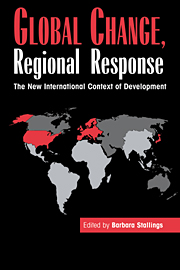1 - Introduction: global change, regional response
Published online by Cambridge University Press: 05 June 2012
Summary
The 1980s and early 1990s witnessed historic changes in the patterns of economic development that had prevailed since the end of World War II. New winners and losers emerged within what had traditionally been called the “third world.” Thus, as the new century approaches, East Asia's newly industrialized countries (NICs) are on the verge of joining the developed world. At the other extreme, a large part of the African continent has experienced an absolute decline in living standards, and its future prospects appear dim. In between, other countries in Asia, Latin America, and the Middle East are trying – with various degrees of success – to reposition themselves to take advantage of new global dynamics. Finally, a new group of third world nations has appeared as a consequence of the collapse of communism. Eastern Europe and the former Soviet republics are now facing many of the same problems as other developing countries and competing with them for available resources.
There has been a great deal of debate about the reasons for the differential success in achieving economic development. In this book, the authors stress the importance of two sets of variables: international and regional. While not denying the role of domestic economic, political, and cultural factors, we believe that recent analysis has seriously underestimated the relevance of international variables and overlooked the importance of geographic location. Moreover, there has been an interaction between international and regional factors in ways that skew an individual nation's chances of achieving rapid growth with a measure of equity.
Information
- Type
- Chapter
- Information
- Global Change, Regional ResponseThe New International Context of Development, pp. 1 - 30Publisher: Cambridge University PressPrint publication year: 1995
Accessibility standard: Unknown
Why this information is here
This section outlines the accessibility features of this content - including support for screen readers, full keyboard navigation and high-contrast display options. This may not be relevant for you.Accessibility Information
- 3
- Cited by
